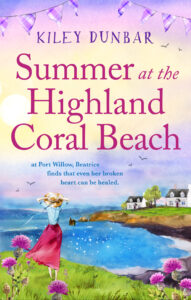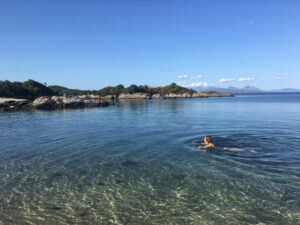 I call my third novel, Summer at the Highland Coral Beach, ‘the book of my heart’ as it was deeply emotional to write.
I call my third novel, Summer at the Highland Coral Beach, ‘the book of my heart’ as it was deeply emotional to write.
The story follows Bea six months after the miscarriage of her longed-for baby. She’s approaching her fortieth birthday, her marriage has ended, and she’s spiralling. Bea books a spur-of-the-moment crafting holiday in the highlands at the eccentric Princess and the Pea Inn (complete with towering fairy-tale bed). Here, Bea has time to wild swim off the coral beach, make beautiful things, and process her grief a little, helped by willow weaving tutor, Atholl.
Having grown used to keeping her grief to herself (so often grieving parents find they have no outlet for their sadness), the words spill from her during a panic attack witnessed by Atholl. He strikes upon a way of helping Bea begin to say goodbye.
I love this scene because it depicts things not all that often discussed in ‘light’, cosy romances.
He produced a parcel from under his arm and unwrapped the brown paper that protected it. ‘I thought maybe, if you want, you could make use of this wee thing?’
He handed her the intricately weaved hollow bassinette shaped curiously like a Russian doll or an ancient Egyptian sarcophagus with a round hole where the face would be.
‘I made it myself of the spring’s youngest willow back in March.’
‘It’s lovely. What is it?’ Bea asked.
‘It was for a talk Seth was giving about old Highland customs. It’s a swaddling basket. You’d wrap the baby in cloths and bands, tucking them up tight so they could sleep, and then they’d be placed inside the basket and worn over the parent’s back while they worked in the fields or at the fishes.’
‘It’s beautiful. It’s tiny, though. Too small for a newborn.’
‘It was only a model, to show what the real thing would be like.’
Beatrice turned it over in her hands, her eyes misting, and she looked up at him, hesitatingly, still unsure of what he intended her to do.
‘There’s another Highland custom, an ancient one, going back to the earliest folk on the land,’ he said softly. ‘When a loved one passed, they would swaddle them too like a bairn, placing them in the water, letting the tides carry them home.’
Beatrice took his meaning and she bobbed her head as the silent tears came again.
‘Do you want to do it now? There’s a braw moon lighting the harbour.’
‘All right.’
Those were the last words they said to each other that night as Beatrice, the mother of a loved son, threaded the Highland posy of forget-me-nots, heather and white campion into the loose basket work, weaving each flower in amongst the shoots from the sappy willows as Atholl watched on.
 When her work was done she left the inn, crossing the dark road and leaning over the sea wall. Atholl stayed by the inn porch, close enough to see her kiss the little bundle before lowering the empty bassinette onto the surface of the gentle waters.
When her work was done she left the inn, crossing the dark road and leaning over the sea wall. Atholl stayed by the inn porch, close enough to see her kiss the little bundle before lowering the empty bassinette onto the surface of the gentle waters.
Neither could tell how long it took for the horizon to claim the floating focus of so much of her grief but by sunrise it was gone and Beatrice was asleep soundly in her bed.
Despite the sadness, there’s love and laughter in store for Bea and Atholl. I’ve received many messages from parents saying how Bea’s story helped them. I hope it continues to offer a wee bit of brightness to yet more readers when Summer at the Highland Coral Beach comes out on paperback this July.
One in four pregnancies end in miscarriage, the miscarriage association is there to help: https://www.miscarriageassociation.org.uk/

